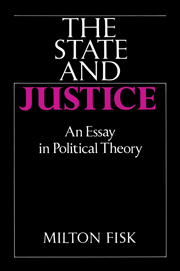Book contents
- Frontmatter
- Contents
- Preface
- Introduction: Can the state rule without justice?
- Part One An outline of a materialist political theory
- Part Two An assessment of the place of justice in the state
- Part Three A functional view of political institutions
- Part Four An account of the community of states
- Part Five A reflection on the transition to a new kind of state
- 21 Liberal egalitarianism
- 22 Revolutionary anarchism
- 23 Democracy and the transition to socialism
- 24 The socialist state
- Conclusion: State, class, and democracy
- Notes
- Index
21 - Liberal egalitarianism
Published online by Cambridge University Press: 06 July 2010
- Frontmatter
- Contents
- Preface
- Introduction: Can the state rule without justice?
- Part One An outline of a materialist political theory
- Part Two An assessment of the place of justice in the state
- Part Three A functional view of political institutions
- Part Four An account of the community of states
- Part Five A reflection on the transition to a new kind of state
- 21 Liberal egalitarianism
- 22 Revolutionary anarchism
- 23 Democracy and the transition to socialism
- 24 The socialist state
- Conclusion: State, class, and democracy
- Notes
- Index
Summary
The focus of this chapter will be the liberal conception of radical justice. This conception is called liberal because of the specifically liberal conception of human nature it assumes. It might be thought that this liberal conception of justice had already become the state's pattern of justice in modern liberal democracies, leaving no room for a liberal critique of state justice in them. In fact, liberals have plenty of room for finding fault with actual state justice in liberal democracies on the basis of liberalism's conception of human nature.
Human nature and the right to equality
Of fundamental importance for liberal theory is the idea that humans are actors guided by personal interests. These personal interests are also called private to emphasize that they differ from social interests. An individual will be said to have a social interest provided, first, it is satisfied only when a similar interest on the part of others in the relevant social group is satisfied and, second, it is satisfied by a joint effort with them. A personal, or private, interest need not satisfy either of these two requirements.
By making personal interests the basis for humanity, human beings are regarded as basically discrete in the sense that they are what they are apart from links with others of the sort they would have if social interests were part of their nature.
- Type
- Chapter
- Information
- The State and JusticeAn Essay in Political Theory, pp. 275 - 288Publisher: Cambridge University PressPrint publication year: 1989



